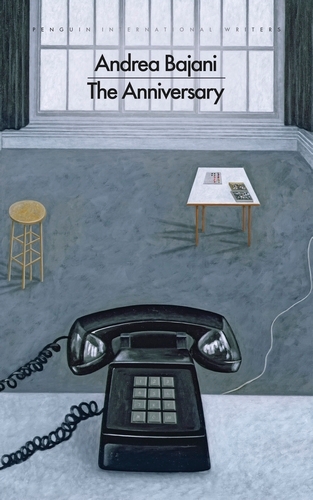Penguin International Writers
#1 - Lowest Common Denominator
In this charming patchwork of fever dreams and memories, Pirkko Saisio transports us to the 1950s Finland of her youth, where she navigates life as an only child of communist parents. Convinced she will grow up to become a man, a young Pirkko keeps trying and failing to meet the expectations of the adults around her. But as she discovers that she can be the narrator of her own story, it is in language that she finds a refuge and a way to be seen at last.
In a world where mascara-streaked mermaids dodge tennis balls, a beloved green cap is stolen by the Big Bad Wolf, and the first tugs of infatuation are inspired by a swimsuit-clad circus announcer, Saisio captures the heart-wrenching intensity of childhood as it floods back in the wake of her father’s death.
Deeply moving and disarmingly funny, Lowest Common Denominator is the first volume in a trilogy that has been celebrated in Finland as the best work of the century.
'Playful and profound... a captivating glimpse into twentieth-century Finland through the eyes of a charismatic child narrator. I loved it' Fiona Mozley
© Pirkko Saisio 2025 (P) Penguin Audio 2025
#3 - The Red Book of Farewells
In 1970s Helsinki, a revolutionary storm is blowing through Pirkko Saisio’s university. She has moved out of her family home, joined a communist theatre, and fallen in love for the first time. Her newly shaved head looks unmistakably modern, and Bertold Brecht lives on her windowsill to profess God-like words of wisdom.
Playful, moving and original, this autofictional coming-of-age story embeds the reader in a world where art and activism are irrevocably intertwined, and where queer love, still a crime, thrives in underground bars.
In her mesmerizing account of radical politics and sexual awakening, Pirkko Saisio offers a series of farewells, to her mother, to the idealism of youth, to friends and lovers and finally to her grown daughter. The grand finale of the award-winning Helsinki trilogy, The Red Book of Farewells embraces the revolutionary potential of moving on.
A Leopard-Skin Hat
A series of short scenes paints the portrait of a strong-willed and tormented young woman battling many demons, and of the Narrator’s loving and anguished attachment to her. Serre poignantly depicts the bewildering back and forth between hope and despair involved in such a relationship, while playfully calling into question the very form of the novel. Written in the aftermath of the death of the author’s little sister, A Leopard-Skin Hat is both the celebration of a tragically foreshortened life and a valedictory farewell.
Translated from French by Mark Hutchinson.
You Are the Führer's Unrequited Love
‘Which is the most seductive, truth or fiction?’
This is the story of Albert Speer: The protégé. The ‘good Nazi’. The star. The mythmaker.
In 1969 Speer, Hitler’s favourite architect and Minister of Armaments and War Production, publishes his memoirs. Rewriting his own past, claiming to have known nothing about the Final Solution, he declares himself ‘collectively responsible, but not individually guilty’.
It is one of the greatest lies in history.
Jean-Noël Orengo’s electrifying novel is the story of a man who saved his skin through the countless fictions he created about himself. A man with a talent for survival, who dazzled those around him with his monuments to power and then, escaping death, reinvented himself as a bestselling author. A man once described as the Führer's unrequited love.
It is a story of power and ambition, self-interest and self-deceit – and what happens in a war over the truth.
Women Without Men
This internationally acclaimed masterpiece by one of Iran’s most important and influential writers traces the interwoven destinies of five women – including a wealthy middle-aged housewife, a sex worker and a schoolteacher – as they arrive by different paths to live together in an abundant garden on the outskirts of Tehran.
Drawing on recent Iranian history and transcendent elements of Islamic mysticism, Parsipur’s unforgettable novel sees women escaping strict confines of family and society. It is still as pertinent and discerning today as it was when travelling secretly from hand to hand upon its first publication in 1989.
Natalja's Stories
This is the story of a young woman who is spirited away to St. Petersburg from Copenhagen by a lovestruck admirer. When she dies after the Russian Revolution, her ashes are carried back to Denmark, igniting a chain reaction of further stories, told and retold by the women in her family against a shifting ground of meaning. We meet murderers and fable-like characters, such as the hilarious and unsettling Viktor Blanke, who manages to seduce not one but three generations of mothers and daughters. Natalja, we discover, cannot be held in one place. Rather than giving in to the tragedy that befalls her, she wills herself to become someone else, reinventing her family’s narrative one irresistible tale at a time.
Tantalizing and full of wit, this remarkable, shape-shifting novel is available in English for the first time.
Blinding: The Left Wing
'This is writing of overwhelming accomplishment' Chris Power, Observer
An enthralling, hallucinatory masterwork by one of Central Europe’s most celebrated novelists
‘We exist between the past and future like the vermiform body of a butterfly, in between its two wings’
Beneath the streets of communist Bucharest linger hidden passageways, lost to memory. Here, sprawling hospitals give way to travelling circuses and underground jazz clubs, and Cartarescu’s childhood, prehistory and visionary fever dreams are woven into the landscape of the city, haunted by secret police and zombie hoards.
Part visceral dream-memoir, part phantasmic pilgrimage, Mircea Cartarescu’s Blinding is one of the most widely heralded literary sensations in contemporary Romania, and a fascinating, kaleidoscopic journey into the past.
I Don't Care
I Don't Care presents the best short fiction by the Hungarian master Ágota Kristóf, selected by the author herself and available in English for the first time. Written immediately before her acclaimed Notebook trilogy, the works here oscillate between parables, surrealist anecdotes, and stories animated by a realism stripped to the bone. By turns harrowing and whimsical, cruel and sharply funny, Kristóf’s world shifts our gaze to a shared reality, past and present. Here exile and existential alienation are undeniable – as is the force of every sentence, making for extraordinary and essential reading.
The Anniversary
'On that day, ten years ago, I saw my parents for the last time. Since then I’ve changed phone numbers, houses, continents, I’ve erected an impregnable wall and put an ocean between us. They’ve been the best ten years of my life.'
A son is celebrating a bittersweet anniversary. It is a decade since he saw his parents: the father who ruled through petty acts of intimidation and fear, the mother who silently accepted it, fitting herself in the spaces around others’ lives. As he looks back, he recalls the airless family home, unsettled only by the ringing of a telephone, or a visitor who was soon rejected. And he remembers how he became possessed by the irrepressible desire to be free, to live his own life. But can you ever escape the grip of your origins?
At once unflinchingly honest and razor sharp, The Anniversary is above all a novel of liberation which dismantles the tyranny of the family. It becomes a mirror in which we glimpse something that, even if we have not known it, affects us all.
Virtue and Rosalind
International Booker shortlistee Anne Serre once again affirms herself a master of literary form and innovation. Lavish in scope, yet entirely unadorned and direct in style, Virtue and Rosalind leaves the reader with the sensation of having absorbed a whole library in one sitting – all in the company of a shrewd and hilarious friend, as we ourselves become a surface onto which she imprints her dazzling storytelling.
Troll
As the townspeople torment the earth, the troll’s duties become heavier: she must kill them, and she suffers for it. Fearing both the king, whose cruel hands direct their lives, and the troll’s punishment when they follow the king’s orders, Karoline, Erik, Johan, Petra and Kaj grow increasingly desperate.
Translated from Danish by Hazel Evans.








